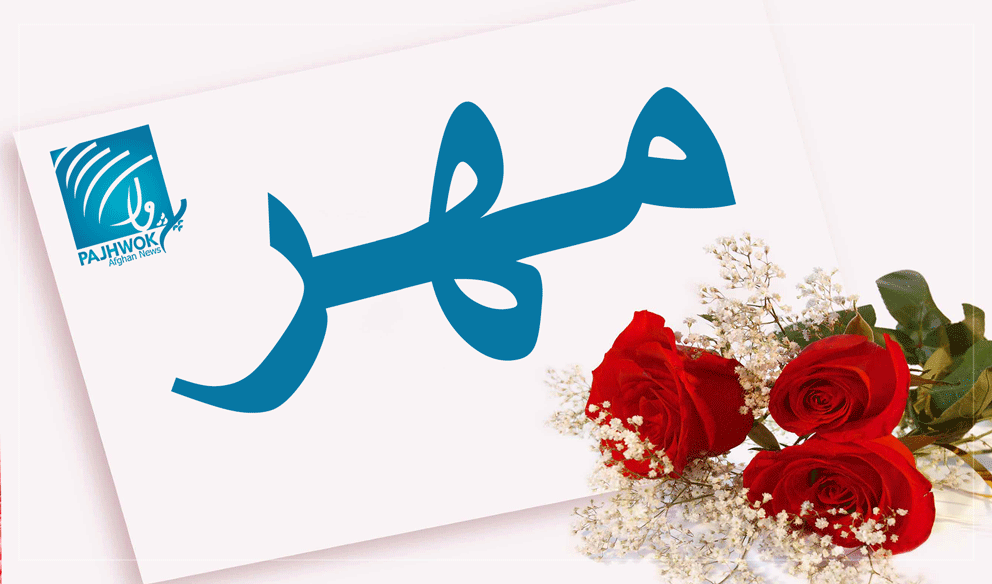MAIDAN WARDAK(Pajhwok): Some women in different parts of Afghanistan complain their husbands continue to deny them their right to dowry and they cannot even ask for it to avoid family issues.
Religious scholars say a woman reserves the right to decide on the determination of her dowry. From the Islamic viewpoint, a good marriage is one with minimum dowry.
Bakht Bibi, a resident of the Hazara village of Maidan Wardak province, says her dowry was set at 12,500 afghanis at the time of her nikah (marriage contract), but she has not yet received this amount.
“My family had received 350,000 afghanis in marriage money from my in-laws. With that, they bought me household items, clothes and jewellery, but during the marriage, my dowry had been set at 12,500 afghanis — an amount I have not yet received.”
She married 13 years ago and is the mother of six children. Bibi says she asked her husband several times to pay the dowry but he refuses.
“We live in a joint family with my in-laws, I cannot seriously ask my husband to give me my right. If he pays me instead of the family, his brothers will feel offended.”
She added she did not want to disturb the peaceful life of her family by seeking her dowry.
Fatima Nazari, a resident of Zaranj who got married six years ago and has a four-year-old son, is still unaware of her dowry amount.
She urged her husband to make her an official marriage certificate setting out the amount of dowry.
“I wanted to set my dowry high, but my father-in-law said they have fixed it at10 dirham that my husband should give me. But I replied no one had asked me about this.
“I told my in-laws that I want an official marriage certificate and the amount of dowry should be set based on my choice,” she explained.
Nazari said she had problems with her in-laws and wanted to demand high dowry so her husband could not divorce her or tie the knot with another woman.
As a result, she endured violence, insult and beatings.
Zahra, a resident of Bamyan who married about 25 years ago and has five children, revealed her dowry had been fixed at 50,000 afghanis, but she had not yet received it.
Zahra acknowledged many women did not want to demand dowry because they tried to steer clear of family complications.
For example, she said: “In our neighborhood, an educated woman once asked her husband for dowry and the demand led to problems and family issues.
Fatimah, 22, from Herat City, said the amount of her Mahar was not known to her at the time of her wedding.
She said there was no clarity about this tradition that women should be given their Mahar or they are entitled to demands their Mshar, in general life women don’t make these demand only during divorce they ask for the amount of Mehar.
She said: “Most of the time when women ask their husbands for Mehar so most of the time husbands replay that the money which their father had charged during the wedding qualified for Mahar what else do you ask for, what is Mahar and who invented Mahar.”
Nazdana, 21, from Daikundi’s Neilli City, said at the time of Nikah her Mahar was 500,000 afs decided but she only got 150,000 afs and was unaware of another amount.
She said women never dare to demand their Mahar despite the fact that they are aware of the amount of Mahar they should be given.
Nazdana said: “When women demand their Mahar, the husbands threaten wives with divorce and other consequences, therefore women never dare to get their Mahar.”
Maryam, from the Hadai locality in Nangarhar, got married six years ago and have two children, said that her Mahar was 200,000 Pakistani rupees but she could not get the amount so far.
She said most women are married in Badal and they have no Mahar and some could not raise their voice because their fathers had taken the Mahar amount.
Religious scholars believed that Mahar was the right of women and it was proven by the holy Quran.
Mawlavi Noorullah Kawsar, said Mahar is the amount of money provided to a bride against Nikkah, Allah (SWTA) made Mehar Fard and should be given to the bride.
He said: “There are two types of Mahar — Moaajal (urgent) or Moajal (non-urgent), it is the bride’s right that she could ask for it urgently or sometimes later, it is the reasonability of the groom to give Mahar to the bride, individual who did not have the ability to earn a livelihood, pay Mehar could not get married because in such circumstance it is prohibited if a woman forgives her Mahar it is a spate thing but without Mahar there is not Nikkah.”
He said the amount the girl father is taking it totally Haram and could not be counted as Mahar.
Mawlavi Abdul Ghafar Farooq, spokesperson of for the Propagation of Virtue and the Prevention of Vice (MPVPV), said that after the takeover of the IEA 7645 properties in which women Mahar shares included had been registered and its papers handed over to the judiciary.
He said around 4,600 had been facilitated to their hereditary rights, the cases of 7,400 women sent to courts, around 5,000 women had received their hereditary rights, 4740 cases of violence cases had been thwarted and reports regarding these incident had been sent to relevant institutions.
He said most of these cases belonged to Mahar, hereditary and other rights in which the father-in-law, brother, and uncle had created problems, the Complaint Hearing Department of the MPVPV had addressed these disputes or sent letters to relevant institutions for resolution.
sa/mud/nh








GET IN TOUCH
NEWSLETTER
SUGGEST A STORY
PAJHWOK MOBILE APP